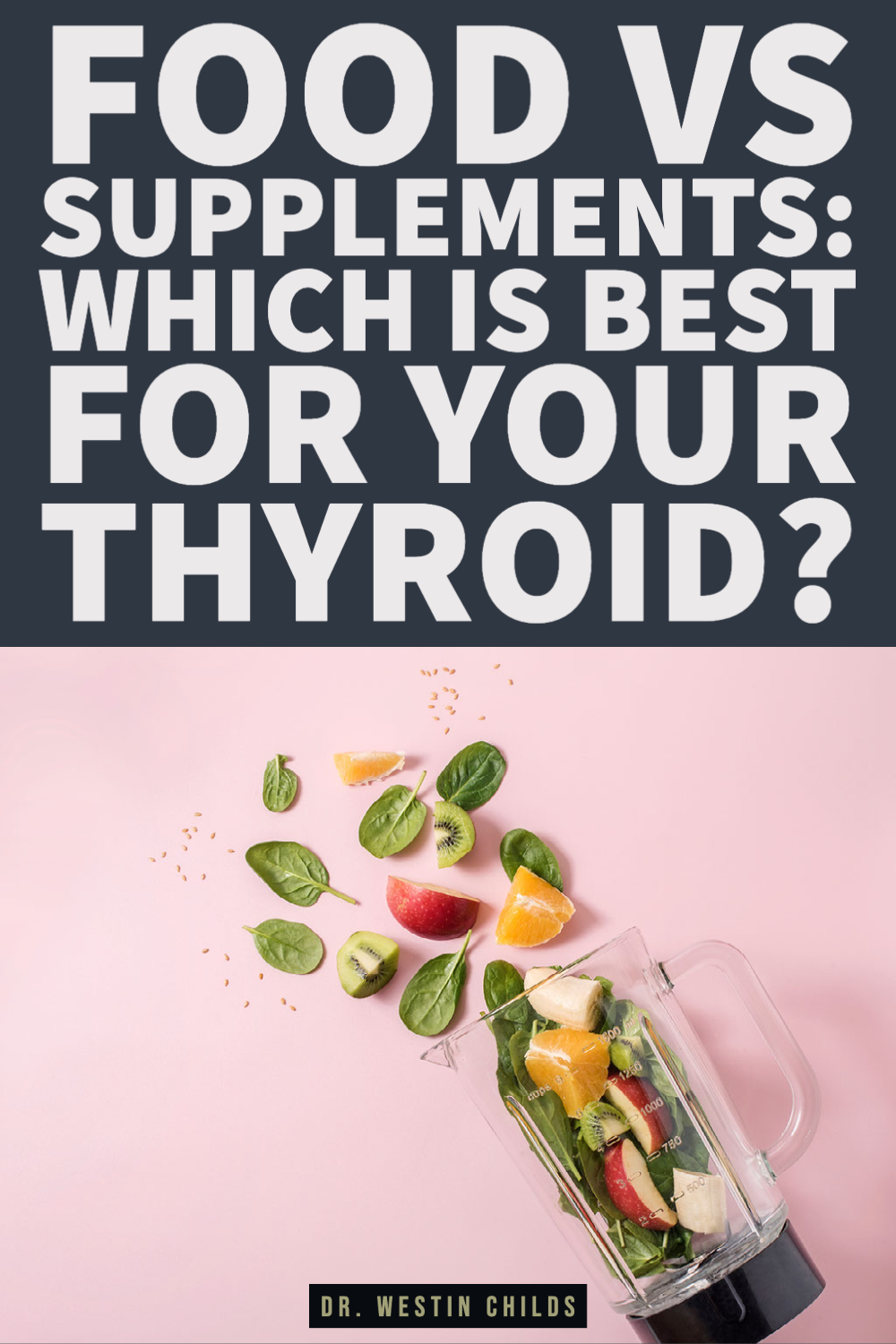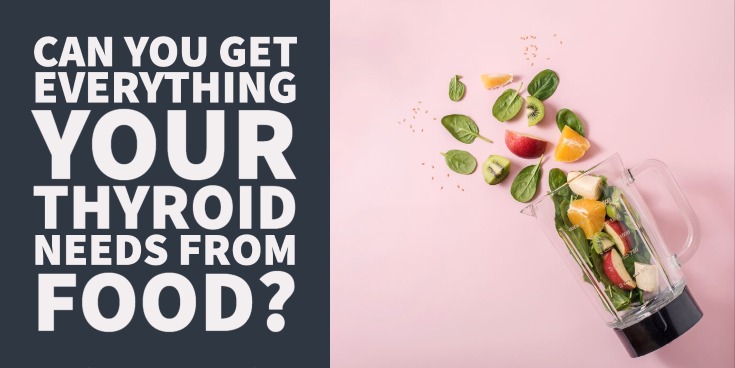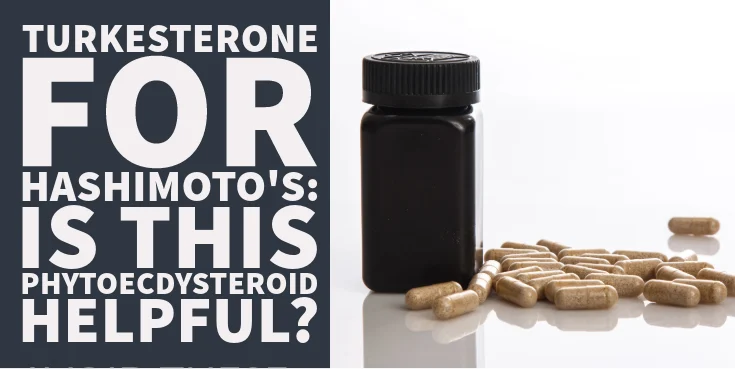Yes, well, sort of, but not exactly…
After that very confusing answer, allow me to elaborate:
In a perfect world, you would eat real whole foods every single day, you’d eat a variety of plants and animal-based food, you would eat enough variety to confidently conclude that you “eat the rainbow”, and these foods would be rich in the nutrients that your body and thyroid need.
As you can imagine, we don’t live in a perfect world, and none of us are perfect.
With very few exceptions, you are probably going to eat processed foods every now and then, you’re probably going to be under stress which will impact nutrient excretion (1), and you may find yourself with a medical condition that impacts your ability to absorb, utilize, or metabolize these nutrients (2).
Given this, is it still possible to get everything that your thyroid needs from real, whole foods?
Yes, but it’s not always practical.
Your thyroid has a pretty big demand for certain nutrients and vitamins because these nutrients allow you to adequately manufacture thyroid hormone.
When you are in a state of low thyroid hormone production, the demand for these nutrients goes up.
And you have the option to meet that demand by eating certain foods (altering your diet) or taking certain supplements.
To make matters a little more complicated, you also need to weigh in the fact that low thyroid states negatively impact nutrient absorption.
So even if you are eating the right foods and taking the right supplements, you need to account for decreased absorption.
The result of these two factors is that thyroid patients have unique needs that the normal population doesn’t have to deal with.
But I’m sure I’m probably preaching to the choir here, you don’t need me to tell you that standard advice and treatments don’t work for you as well as the general population because you’ve already tried them.
So instead of preaching, let’s talk about what you can do to fix the issue.
Today we will be discussing:
- The difference between getting nutrients from food and supplements (and which is best)
- What type of foods contain the nutrients that your thyroid needs (and how much you need to eat)
- When it makes sense to get these nutrients from food or from supplements
- And whether or not you are eating for your thyroid
Let’s jump in…
Food vs Supplements: Which is Best?
As someone who creates and formulates supplements, I can tell you that the answer to this question is easy:
You should always try to get as many nutrients from your food or diet as humanly possible!
There’s probably a rare situation where taking supplements may be preferred over food (for something like food intolerance or malabsorption syndromes) but, for the most part, your goal should be to eat as many real whole foods as possible.
Whole foods contain a broad array of nutrients, phytonutrients, and compounds (3) that are used by your entire body and your thyroid.
Having said that, I think we all realize there’s something special about certain foods because of the nutrients they contain.
Here’s what I mean:
Patients with thyroid problems would benefit from foods that are naturally higher in thyroid-supporting nutrients like zinc, selenium, and even iodine (just to name a few).
It’s not that other whole foods aren’t healthy, there are just some that contain a more balanced nutrient profile when considering the needs of the thyroid gland.
Some people refer to these foods as superfoods.
Even though they are super, there’s nothing magical about these foods except that they contain more of the nutrients that you need compared to others.
As a result, eating specific foods may be ideal if you have a thyroid condition when compared to other foods.
But here’s where things get a little tricky and where the need for supplementation arises:
What if you don’t like to eat certain foods? What if foods that are high in zinc, for instance, smell funny or taste funny to you?
What if you have intolerances to thyroid superfoods? Or they cause bloating or gas or distention when you eat them?
Should you force them down just because they are “healthy” for your thyroid?
No way!
The use of supplements solves this problem.
If you can’t tolerate any of the foods that we are about to discuss then you can simply make up the difference with the use of supplements.
It’s as easy as that.
With all of this in mind, let’s talk more about eating for your thyroid gland.
Below you will find a list of some of the most important thyroid-supporting nutrients and foods that naturally contain very high amounts of these nutrients.
If possible, it would be a good idea to consider eating these foods.
If you are unable to eat them (for whatever reason), then supplementing may be a good idea!
DOWNLOAD FREE RESOURCES
Foods to Avoid if you Have Thyroid Problems:
I’ve found that these 10 foods cause the most problems for thyroid patients. Learn which foods you should avoid if you have thyroid disease of any type.
The Complete List of Thyroid Lab tests:
The list includes optimal ranges, normal ranges, and the complete list of tests you need to diagnose and manage thyroid disease correctly!
#1. To get your daily dose of Zinc, you’d need to eat:
Zinc is incredibly important for thyroid function because it’s required for:
- The conversion of T4 thyroid hormone to T3 thyroid hormone
- The production of TRH (4) (thyroid-releasing hormone) from the hypothalamus
- The binding of T3 thyroid hormone to the thyroid nuclear receptor (5)
- Immune function and general immune health (6)
As a general rule of thumb, thyroid patients should aim to get around 5 to 20mg of zinc from foods each day.
Here are some foods naturally high in zinc and their average zinc concentration:
- Oysters – 32 mg/serving
- Beef (sirloin) – 3.8 mg/serving
- Blue crab – 3.2 mg/serving
- Breakfast cereals – 2.8 mg/serving
- Pumpkin seeds – 2.2 mg/serving
- Pork – 1.9 mg/serving
- Turkey breast – 1.5 mg/serving
- Cheese – 1.5 mg/serving
- Shrimp – 1.4 mg/serving
- Lentils – 1.3 mg/serving
- Sardines – 1.1 mg/serving
- Greek yogurt – 1.0 mg/serving
- Milk 1% – 1.0 mg/serving
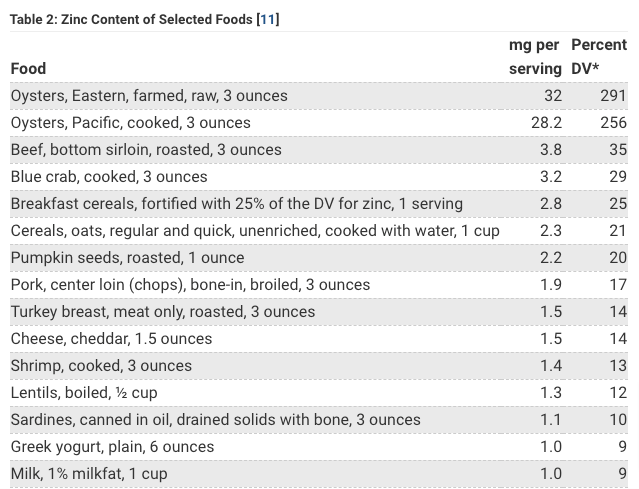
When it comes to zinc, there’s a clear winner: oysters.
Oysters are hands down the best source of zinc available for thyroid patients.
And when you put this information into context, what I mentioned above about food preferences start to make a lot more sense.
How often are you eating oysters? Do you even like oysters? Are you planning on eating them every single day?
Because zinc is one of those nutrients that your body doesn’t store very much of you need to be consistently getting it every single day.
Based on the recommended daily zinc intake for thyroid patients of at least 5 mg, here’s how much of the food listed above you’d need to eat each day to meet it:
- Oysters – 1 serving
- Beef – 2 servings
- Blue crab – 2 servings
- Breakfast cereals – 3 servings (obviously not an ideal source!)
- Pumpkin seeds – 3 servings
- Pork – 3 servings
- Turkey breast – 4 servings
- Cheese – 4 servings
- Shrimp – 4 servings
- Lentils – 4 servings
- Sardines – 5 servings
- Greek yogurt – 5 servings
- Milk 1% – 5 servings
The recommended 5 mg intake range is really just the bare minimum for thyroid patients as many patients benefit from doses all the way up to 20 mg per day.
When calculating your daily intake don’t forget that you are likely getting a small amount of zinc from other foods as well.
Based on the information above it’s probably easy to see why adding a small dose of daily zinc in the form of a supplement is a good complement to a whole-food diet.
This same principle will apply to many of the nutrients we are going to discuss as well.
#2. To get your daily dose of magnesium, you’d need to eat:
Next on the list is magnesium.
And as a thyroid patient, magnesium is important for the following reasons:
- It’s required for ATP production (7) which is necessary for iodine entry into the thyroid gland
- It helps balance the immune system and may reduce inflammation
- Magnesium deficiency directly impacts thyroid function (8) and may lower free thyroid hormone levels
- It’s needed for glutathione production to protect your thyroid gland from autoimmune disease and inflammation
- It’s required for cortisol regulation and metabolism
It’s obviously clearly important for a range of thyroid-related factors but it’s also just a general all-around important mineral that your body needs for other reasons as well.
As far as I can tell, the #1 reason for magnesium deficiency amount thyroid patients is usually due to a combination of inadequate intake and over metabolism from stress.
These two factors lead many thyroid patients to sub-optimal magnesium levels which can negatively impact thyroid function.
If we look at the recommended daily intake guidelines from standard organizations, you should be getting around 400mg of magnesium a day as a male and about 300mg of magnesium a day as a female.
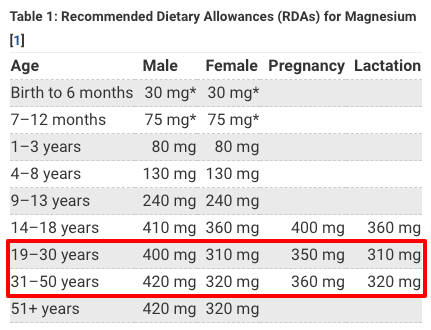
The RDA has a tendency to under-recommend daily intake but the guidelines for magnesium are pretty accurate based on my experience.
When it comes to magnesium intake, though, a good goal should be to get at least 400mg per day from all sources but don’t stress about going over this value.

Unlike some of the other nutrients we will soon discuss, taking too much magnesium is not an issue and may just lead to some temporary gas or bloating, or loose stools that resolve within about one day.
It’s far better to deal with these temporary side effects than deal with the consequences of insufficient intake.
Below you will find a list of the most magnesium-rich foods and how much of each you will need to eat to get to that 300mg-400mg baseline need:
- Pumpkin seeds – 156 mg/serving
- Chia seeds – 111 mg/serving
- Almonds – 80 mg/serving
- Spinach – 78 mg/serving
- Cashews – 74 mg/serving
- Peanuts – 63 mg/serving
- Cereal – 61 mg/serving
- Soymilk – 61 mg/serving
- Black beans – 60 mg/serving
- Edamame – 50 mg/serving
- Peanut butter – 49 mg/serving
- Potato (baked) – 43 mg/serving
- Brown rice – 42 mg/serving
- Yogurt – 42 mg/serving
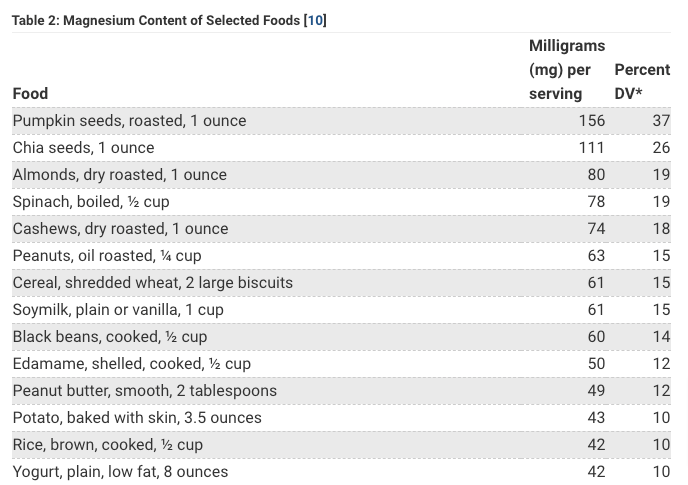
To get to that 300-400mg baseline need, you’d need to consume this many servings:
- Pumpkin seeds – 2 servings
- Chia seeds – 3 servings
- Almonds – 4 servings
- Spinach – 4 servings
- Cashews – 5 servings
- Peanuts – 5 servings
- Cereal – 5 servings
- Soymilk – 5 servings
- Black beans – 5 servings
- Edamame – 6 servings
- Peanut butter – 7 servings
- Baked potato – 7 servings
- Brown rice – 8 servings
- Yogurt – 8 servings
As you can see, pumpkin seeds and chia seeds are the clear winners here.
Pumpkin seeds would definitely be the premier choice because they also contain a fair amount of zinc as well.
This means pumpkin seeds are an easy way to get both magnesium and zinc in one food.
Some choices you’d probably want to avoid as a thyroid patient include peanut butter, soy-based products, and foods that are heavy in carbohydrates (like brown rice) just because it wouldn’t be practical or a good idea to eat 8 servings of brown rice each and every day.
Other good alternatives would include spinach and almonds.
Just like zinc, though, you can see a scenario in which adding a small daily supplement of 150mg of magnesium each day makes a lot of sense.
#3. To get your daily dose of selenium, you’d need to eat:
In terms of its importance to thyroid function, selenium ranks in the top 5.
It helps your thyroid function in the following ways:
- It’s required for T4 to T3 conversion (9)
- It protects the thyroid gland from hydrogen peroxide-induced damage (10)
- Supplementation has been shown to reduce thyroid antibodies in some cases (11)
- It’s necessary for the production of glutathione in the thyroid gland (much like magnesium but for different reasons)
Unlike some of the other nutrients and minerals we have discussed so far, selenium is one that you definitely do not want to take too much of.
Selenium toxicity may lead to symptoms that mimic those of hypothyroidism including things like hair loss, brittle nails, fatigue, and joint pain.
The good news is that most thyroid patients are not getting enough selenium so overdosing rarely occurs with food (with few exceptions) but it can occur with supplementation.
The RDA for selenium is 55mcg for adult males and females but thyroid patients tend to do better on doses in the 100-200mcg per day range (from all sources).
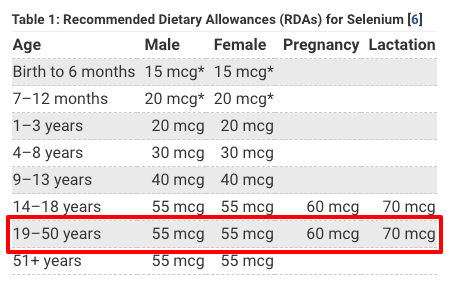
Foods naturally high in selenium include:
- Brazil nuts – 544 mcg/serving
- Tuna – 92 mcg/serving
- Halibut – 47 mcg/serving
- Sardines – 45 mcg/serving
- Ham – 42 mcg/serving
- Shrimp – 40 mcg/serving
- Macaroni – 37 mcg/serving
- Beef steak – 33 mcg/serving
- Turkey – 31 mcg/serving
To get the recommended daily intake of selenium for thyroid health of at least 100mcg per day, you’d need to eat:
- Brazil nuts – 1/4 to 1/2 of a serving (depending on the source)
- Tuna – 1 to 1 1/2 servings
- Halibut – 2 to 2 1/2 servings
- Sardines – 2 to 2 1/2 servings
- Ham – 2 to 2 1/2 servings
- Shrimp – 2 to 2 1/2 servings
- Macaroni – 3 to 3 1/2 servings
- Beef steak – 3 to 3 1/2 servings
- Turkey – 4 to 4 1/2 servings
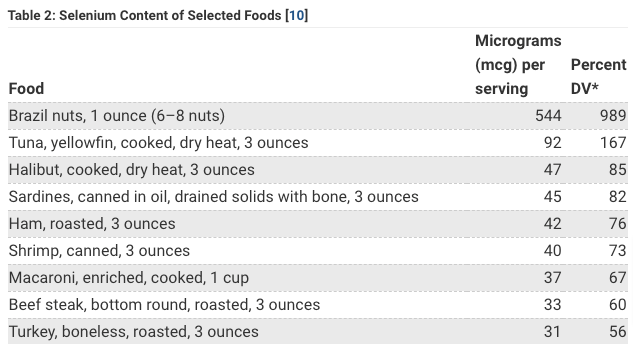
The clear winner here is brazil nuts but that doesn’t mean you should necessarily eat them as a primary source of selenium.
To make a long story short, the selenium content can vary dramatically from brazil nut to brazil nut which makes it an inconsistent way to get selenium into your diet.
Given the extremely high selenium content of brazil nuts and the variability of dosing between each plant, it’s usually better to use other more stable food sources like tuna, halibut, sardines, beef, or turkey.
Even though you will be getting less per serving, you will be better able to control your intake and determine how much you need and benefit from.
This same logic is the reason that selenium supplementation may be preferred to food intake for some people.
#4. To get your daily dose of iodine, you’d need to eat:
We can’t talk about thyroid health without mentioning iodine, even if the mere mention of iodine sparks controversy.
I’ve discussed the importance of iodine and more about the controversy in the past, so I won’t go into that right now, but if you are interested in learning more about that aspect of iodine you can do that here.
What you need to know is that from a physiological standpoint, iodine is something that every single human requires (12), regardless of thyroid status (and, yes, this applies to those with Hashimoto’s and Graves’ disease as well).
Even in cases of complete thyroid removal, some iodine is required for other cells and tissues.
Arguments can be made for lower iodine intake in cases where thyroid medication is being used, but no matter what side of these arguments you land on, you must acknowledge that iodine is essential.
The primary reason for this is that iodine is necessary for the production of thyroid hormones.
And because thyroid hormones are required to sustain our lives, iodine intake, by extension, is also necessary.
The debate doesn’t come down to whether or not it is necessary but, instead, how much should you get.
Daily recommended doses of iodine intake can vary from 0 (which is what some doctors and patients recommend) all the way to 25 grams or more per day.
In my experience, the ideal recommended daily intake for thyroid patients is somewhere between 150 and 300 mcg per day.
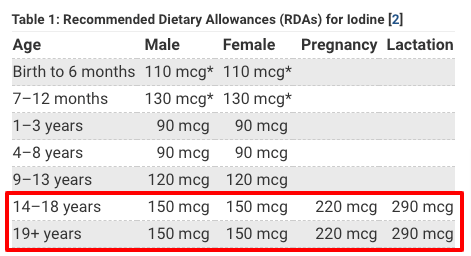
This represents what I consider to be the safest level of consumption, one at which you should not experience any of the negative side effects of iodine intake that thyroid patients and doctors are often worried about.
Some people can tolerate a lot more than this but those higher doses carry risks that I don’t think are worth the small potential gains you might get.
So let’s talk about that in the context of food and supplements.
If you are primarily trying to get iodine from food, here are the best sources:
- Seaweed – 16 to 1984 mcg/gram
- Milk – 94 mcg/cup
- Organ meats – 32 mcg.2/ounces
- Cod – 99 mcg/3 ounces
- Iodized salt – 71 mcg in 1.5 grams
- Shrimp – 35 mcg/3 ounces
- Tuna – 17 mcg/3 ounces
- Eggs – 24 mcg/large egg
- Turkey breast – 30 mcg/2.5 ounces
- Dried prunes – 13 mcg/5 prunes
- Lima beans – 8 mcg/0.5 cups
- Fish sticks – 54 mcg/2 fish sticks
- Yogurt – 74 mcg/cup
- Bananas – 3 mcg/medium-sized banana
- Strawberries – 13 mcg/cup
- Canned corn – 14 mcg/0.5 cup
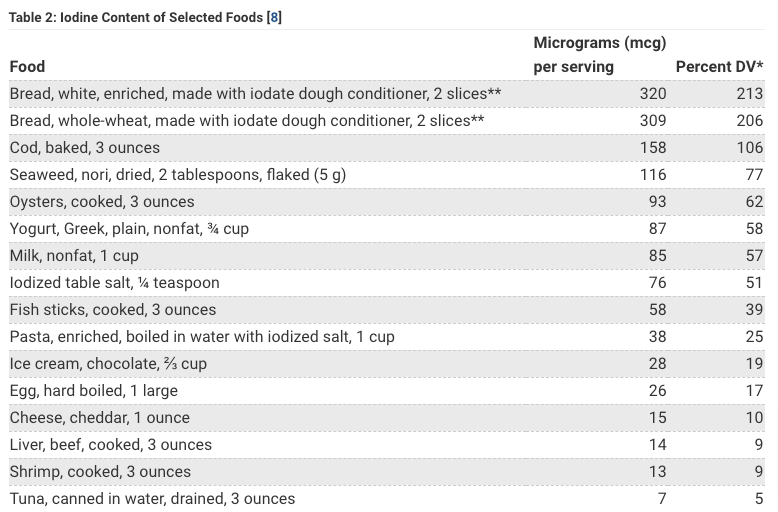
To get the recommended daily intake of 150 to 300mcg of iodine, you’d need to eat this many servings of each:
- Seaweed – 1 gram (or much less depending on many factors)
- Milk – 2 cups
- Organ meats – 12.5 ounces
- Cod – 6 ounces
- Iodized salt – 3 grams
- Shrimp – 15 ounces
- Tuna – 26 ounces
- Eggs – 6-7 large eggs
- Turkey breast – 12.5 ounces
- Dried prunes – 57 prunes
- Lima beans – 9-10 cups of lima beans
- Fish sticks – 6 fish sticks
- Yogurt – 2-2.5 cups of yogurt
- Bananas – 50 bananas
- Strawberries – 12 cups of strawberries
Iodine, much like selenium, is one of those nutrients where it often makes a lot more sense to supplement rather than to try and get all of your intake from your diet alone.
The reason is that the foods that are high in iodine are very high in iodine and those that are low in iodine require so much food that their intake is impractical.
It’s unlikely that you are going to consume 50 bananas each day or 10 cups of lima beans, but it is practical to take a low dose of iodine in supplement form.
I’ve found that supplementing daily with iodine allows for finer titration of your dose, and provides thyroid patients with a better understanding of how each dose impacts their thyroid and body.
Your mileage may vary, though, so feel free to exclusively consume iodine from foods if that is your preference.
There’s a lot of data from certain populations (like the Japanese (13)) which suggest that this method of iodine intake is perfectly safe, even if iodine intake is more variable and much higher using this route.
#5. To get your daily dose of tyrosine, you’d need to eat:
Your body uses tyrosine as a building block to produce important hormones and neurotransmitters like thyroid hormone, epinephrine, norepinephrine, and dopamine.
Tyrosine is considered a non-essential or conditionally essential amino acid which means your body has the ability to create it from other amino acids, specifically phenylalanine.

For this reason, it’s not absolutely required that you consume tyrosine from your diet, nor is it common to be deficient in this nutrient.
Having said that, I still think it’s worth thinking about tyrosine as you think about your overall diet and the impact that it has on your thyroid.
My experience has been that even though I’ve never seen tyrosine deficiency in any thyroid patient, I still see thyroid patients that benefit from taking extra tyrosine as a supplement.
One potential reason for this may be that certain situations, such as exposure to chronic stress, may pull tyrosine metabolism away from thyroid function and towards the production of adrenal hormones like norepinephrine and epinephrine.
I don’t have any evidence to suggest that this occurs but it seems like a plausible explanation for the benefits that I’ve seen in thyroid patients.
Beyond this potential benefit, you should still be aware of foods that are high in tyrosine so you can better imagine the range of foods that you need to eat for general thyroid health and maintenance.
Foods high in tyrosine include beef, pork, fish, chicken, milk, cheese, seeds, beans, nuts, and whole grains.
We don’t really need to talk about RDA when it comes to tyrosine because you will get plenty if you eat even small amounts of the foods previously listed.
Even though you may get enough from your diet, you may still benefit from tyrosine supplementation as l-tyrosine for additional adrenal and thyroid support.
Again, I’m not sure why this occurs but it’s worth experimenting with your own body to see if you benefit from additional doses.
#6. To support your adrenals, you’d need to eat:
Finally, as a thyroid patient, you will want to consume foods designed to support your adrenal health.
We often think of foods as sources of calories and sources of nutrients, but they are also sources of botanical (plant-based) ingredients which have special functions on systems in our bodies.
One group of ingredients that can augment your body’s ability to respond to stress is adaptogens.
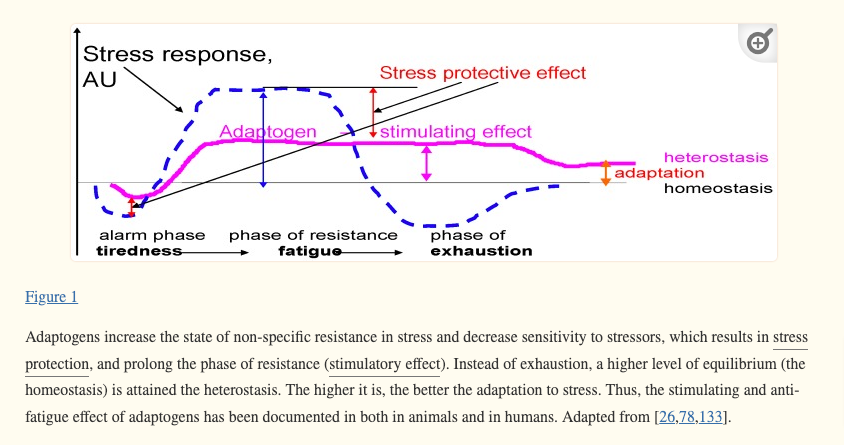
And these adaptogens are incredibly helpful for thyroid patients who tend to suffer from adrenal-related problems.
Because adaptogens aren’t considered essential, we don’t have a recommended daily requirement for them, but that doesn’t mean they aren’t potentially helpful.
I personally use adaptogens just about every single day to combat the day-to-day stress that life throws at me.
And it makes a lot of sense for thyroid patients to do the same, especially given that these ingredients naturally occur in plants and have been used for centuries by various groups of people around the globe.
Here are some foods that naturally contain adaptogens:
- Maca – Maca is a plant that originates from the Peruvian mountains and is frequently used in this region to support vitality, sexual health, and stress resilience.
- Goji berries (14) – Goji berries are considered both a superfood and an adaptogen which means they are jam-packed with micronutrients. They are frequently used for anti-aging, immune health, and reducing inflammation.
- Holy basil (15) – Holy basil is a plant native to India which has been used in Ayurvedic medicine for centuries. It’s frequently used to treat anxiety, stress, diabetes, and high cholesterol.
- Turmeric (16) – The active component in turmeric, known as curcumin, has been shown to have adaptogenic properties. Turmeric and curcumin are frequently used because of their powerful anti-inflammatory properties but have also been used to treat conditions like diabetes, autoimmune disease, and even obesity.
- Mushrooms (17) – Mushrooms like lion’s mane, reishi, chaga, cordyceps, and turkey tail have been used for centuries as well. They have anti-stress properties and are frequently used to enhance cognition, focus, and clarity, reduce the impact of stress on the body, and enhance the immune system.
- Ashwagandha – Ashwagandha, a popular plant native to Asia and Africa, is often used to treat a number of conditions including infertility, insomnia, low testosterone, diabetes, and inflammatory conditions.
- Licorice root (18) – Licorice root is considered an adaptogen and has also been used to treat viral infections and gastrointestinal ailments.
As you can see, these plant-based adaptogens have a wide range of potential benefits outside of their benefits on adrenal health and vitality.
For most thyroid patients, it’s worth experimenting with each to find which one works best for your body.
You can get these plant-based ingredients as powders and take them as capsules, in teas, or even as additives to foods and recipes.
For convenience, many of them are also available as supplements as well.
Wrapping it Up
As I mentioned at the very beginning of this article, you should always put preference on getting as many nutrients as possible from the foods that you eat.
Having said that, there’s still a time and a place for the use of supplements to augment (or supplement!) what you are getting from your diet.
Don’t use supplements as a crutch to make up for a poor diet but instead as an augmentation to fill in the gaps with what you are unable or unwilling to get from natural sources.
I’ve found this to be a winning strategy and one that allows for long-term commitment to the type of diet that is necessary for thyroid patients to feel 100%.
Now I want to hear from you:
Are you solely trying to get all of the nutrients that your thyroid needs from food?
Are you currently using supplements to help meet these nutritional needs?
Are you planning on making changes to your diet or supplement regimen after reading this?
Keep the conversation going and leave your questions or comments below!
